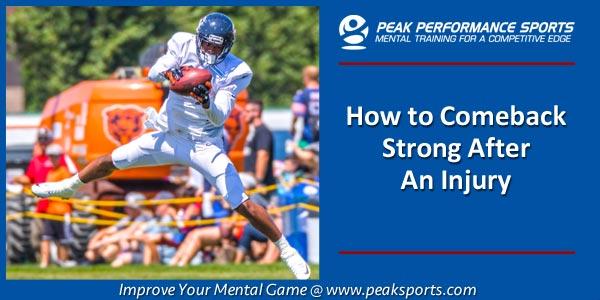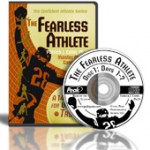
Mental Toughness Tips For Athletes
Injury is a challenge that most athletes will face at some time during their career.
Injuries can range from mild to serious ones requiring surgery.
Injuries are not easy for anyone. For some athletes, the emotional impact of an injury can be devastating.
With injury, athlete have a fear of the unknown, “Will I return one hundred percent?” “Will I lose my starting role?” “What if I get cut from the team?”
How you respond to injury shapes your rehab, return to competition, and post-injury performance.
If you respond with frustration, fear and worry, you will delay recovery and potentially suffer re-injury.
It is normal to experience some negative emotions… the very thing that you love doing has been taken away for a period of time.
The key is to not wallow in those negative emotions and move forward…
BUT HOW TO MOVE FORWARD?
The best antidote for injury is to respond with mental toughness.
By challenging yourself and vowing to come back even stronger, you can benefit from your brief hiatus from competition.
Willie Young is a defensive end for the Chicago Bears who is determined to make a comeback after a season-ending Achilles tendon rupture in 2014.
During the 2014 season, Young had a break-out year recording a career-high and team-high 10 sacks.
Now, Young is faced with, not only the challenge of coming back from injury, but a position switch to outside linebacker.
Young’s attitude has him focused on this year and moving forward. Young shows no fear of re-injury. When asked about the injury this pre-season, Young’s comment was “Last season’s mishap.”
Young responded to his injury with a tough-mindedness that is characteristic of all great athletes.
Young’s mental toughness allows him to view his challenging situation with a positive perspective.
YOUNG: “I’m not worried about [making the team]. I came in as a seventh-round draft pick, and I started from the bottom. So ain’t nowhere for me to go but up. At this point I’m not concerning myself with what might happen or what could happen. I have too much ahead of me.”
The Bears will start preseason with 90 players in training camp but will trim their roster to 53 by the start of the season.
In a what-have you-done-for me-lately league, nothing is guaranteed. Despite the mental hurdles, Young remains positive, prepared and mentally strong for any circumstance.
YOUNG: “I’m ready for whatever. Sometimes I go fishing and the forecast says it ain’t going to rain. But guess what, it might rain. So I have a 100 mph Bass Pro Shop dry suit right in the drop storage hatch. And I can easily walk to the front of my boat, pull it out and put it on and you’re ready for the occasion.”
Tips for keeping a mentally tough mindset when injured:
Instead of feeling sorry for yourself, write down all the mental hurdles you have overcome in the past to arrive at your current level of performance. Create 1-2 positive goals of what you can do while injured to bounce back and achieve greater success.
You may not be able to control injuries, but you can control how you respond to injuries.
Related Sports Psychology Articles
- Control Your Emotions When Returning From an Injury
- The Mental Side of Coping With Injury
- How to Maintain Confidence After an Injury
*Subscribe to The Sports Psychology Podcast on iTunes
*Subscribe to The Sports Psychology Podcast on Spotify
Download a free sports psychology report to improve your mental game!
Learn more about our one-on-one mental game coaching.
The Fearless Athlete

For the last two decades, I’ve been working with athletes and helping them optimize their physical ability by teaching them the secrets of top performing athletes. Now, you too can learn how to regain that child-like fearless attitude.
Mental toughness is what separates the winner from the loser in any competition. Champion athletes train hard in practice, perform without fear in competition, and trust their skills in crunch-time.
The Fearless Athlete program is ideal for any athlete that wants to overcome fear of failure and uncover inhibiting perfectionistic traits; or for any coach or parent who wants to teach athletes to perform with trust and freedom in competition.
